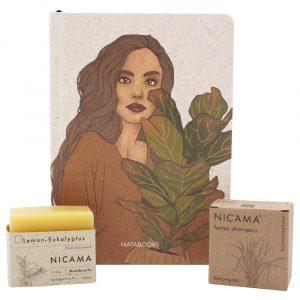We have to talk about it again: Plastic. It pollutes our oceans and ends up on our plates. Microplastics have already been detected in the placenta of an unborn child. It is clear that it is not good for our health and therefore a problem that needs to be eliminated. Another point on the contra side is Microplastics. Plastics are not biodegradable, but break down into smaller and smaller pieces that never completely disappear. The small particles whose diameter is less than 5mm are called microplastics. Due to their small size, we unconsciously eat these particles every day. You can read why in our Environment Day blog post. But it is not only the decay of plastic products that causes the amount of microplastic to increase. Small particles of plastic, which are deliberately added, can also be found in everyday objects. In cosmetics such as glitter, in toothpaste for the whitening effect, or as small beads in peelings. The tiny plastic particles even fly around in the air and float through the earth’s waters. By 2050, there will be more plastic parts in the world’s oceans than fish.
All Together for One Goal
For these reasons, among others, the Australian initiative Western Metropolitan Regional Council launched Plastic Free July in 2011. This movement aims to inspire and educate on how to reduce plastic in everyday life, at work and at school. Participants can share their own personal stories and experiences online. The organization provides tips and suggestions for those just starting out as well as for the more advanced ones. Around the world, schools, shops and organizations from over 69 countries are taking part in a wide range of actions with the aim of reducing the consumption of single-use plastic.
matabooks is also passionate about avoiding (plastic) waste, so we’ve put together our best tips for you.
10 tips for a Plastic-free every day life
- Avoid plastic packaging
Find out if there is a non-packaging shop or weekly market in your area. Here you can often bring your own packaging for transporting the products or use plastic alternatives. Even supermarkets now offer unpackaging and refilling stations as well as paper bags or nets for fruit and vegetables. - Instead of disposable forks – bring your own!
Bring your own straw for the restaurant, the thermo cup for coffee-to-go or the lunch box for cakes from the bakery. At first, it might be difficult to always be well prepared. But as the saying goes: practice makes perfect. You quickly get used to it and soon pack everything automatically. - Watch out for microplastics!
Microplastics are often hidden under names such as Polyethylene (PE), Nylon-12, Acrylates Copolymer or Acrylate Crosspolymer in cosmetics, toothpaste, peelings, shower gels & Co. In the meantime, however, there are some brands that offer natural cosmetics and products without the annoying little Plastic Particles. A quick search on the internet will already list some companies you can buy from with a clear conscience. - Tap water instead of plastic bottle
With Plastic bottles, small plastic particles and plasticizers come out of the bottle over time and mix with your drink. If that doesn’t convince you, think of how many bottles you have to lug home every time you go shopping. A good reason, then, is to simply help yourself to your own tap water. In Germany, the quality of drinking water is very good, so there are no more excuses, are there? - Straight razor instead of a plastic razor
This is a tip for real Money-savers: with a Plastic razor, you constantly have to buy new attachments, which cost several euros each time. With a razor, on the other hand, you only need the individual razor blades, which can be bought for just a few cents each. In addition, you save a lot of plastic because the razor blades simply do not contain any. Sometimes it can be so simple. - Cloth bag instead of plastic bag
Instead of buying a new plastic bag every time you go shopping, just take a cloth bag with you. Are you good with your hands? Then sew your own fabric bag from old clothes, fabric scraps or old bed linen. At the same time, you give the fabric a new life. - Make fire but without plastic!
Matches, electric lighters or refillable lighters replace the cheap plastic lighters that are unfortunately far too often discarded in nature. - Cotton buds made of wood
A tip that doesn’t seem to make much difference to you, but it does to our planet. Conventional cotton buds are made of plastic. This disposable product can cause major problems for the environment and animals. Therefore, use an alternative that uses bamboo instead of plastic, for example. - Dental care without plastic
How many toothbrushes do you need per year? Multiply that by the number of people living in your town. This number alone should set off your inner alarm bells and make you reach for an alternative to plastic toothbrushes. Bamboo toothbrushes are now available in almost every supermarket. They can even be disposed of in the compost. Be aware, however, that the bristles are usually still made of nylon. The head must therefore be cut off and disposed of separately. Toothbrushes are just one of many plastic products. Take a look around your bathroom and see what else you can replace with more environmentally friendly, plastic-free alternatives. - Matabooks instead of books with plastic
Often we don’t even suspect where plastic is contained. Sometimes it makes sense, but far too often it doesn’t. Take books, for example, they are often shrink-wrapped in plastic or contain plastic covers. That is not necessary. That’s why we at Matabooks produce plastic-free books, calendars, notebooks, greeting cards and stationery, which are also vegan because we don’t use glue made from animal bones.
The Meadow Next door
If you compare the speed of growth of grass with that of a tree, you will notice a clear difference. We have taken advantage of this and made Paper from Grass. Our products are plastic-free – if there is plastic, for example, bubble wrap, in an order we receive, we always use it again. It may happen that an order you place contains plastic for padding. However, we have reused this and it is also rather rare. In most orders, we use leftovers from off-cuts or misproductions so that we can protect your matabooks with grass paper. We also keep a close eye on all other production steps, such as Inks, Adhesives and Recyclability, and improve the eco-balance wherever possible.
We want to encourage sustainable consumer behavior and are even more pleased if you also contribute to this. If you still have questions about our products and how sustainable we are in detail, don’t hesitate to contact us. You can do so via Instagram or [email protected]. Or you can just read the FAQ directly.
Plastic-Free-July-Bundle: Matabooks x Nicama

Wow, you actually read the whole article! Thank you so much! As a reward, we have some extra hot news for you: Together with the Dresden-based natural cosmetics manufacturer Nicama, we have created a limited bundle that is only available until 31 July 2021.
It contains plastic-free, vegan and above all sustainable products. The cool thing about it: in the bundle, you get the products at a slightly lower price compared to buying them individually. Take a look and celebrate PLASTIC FREE JULY with us!

